Texas Public Radio’s Science & Medicine is a weekly podcast that explains how scientific discovery at the UT Health Science Center San Antonio advances the way medicine is practiced around the world. It is a collaboration between TPR and The University of Texas Health Science Center at San Antonio.
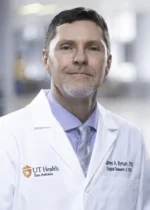 Episode 30: Improving trauma care on the battlefield and at home
Episode 30: Improving trauma care on the battlefield and at home
San Antonio — a health research hub for the military — is an ideal place for research by the Trauma Research and Combat Casualty Care Collaborative (TRC4), an initiative at UT Health San Antonio in partnership with the Department of Defense and the entire UT System to address an urgent need for improved trauma care both on the battlefield and at home.
TRC4 was created to do the kind of cutting-edge research that will improve the care, survival rate and ultimate quality of life for trauma injuries, like traumatic brain injuries and burns.
James Bynum, PhD, TRC4 executive chair and vice chair of research for the department of surgery, said TRC4 provides a major opportunity to try to make a difference for those needing trauma care, as traumatic injuries are the leading cause of death among people ages 45 years old and under.
Episode 29: Revolutionizing prostate cancer treatment
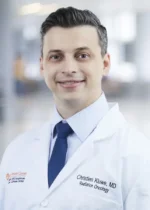 Christien Kluwe, MD, PhD, assistant professor, department of radiation oncology, Mays Cancer Center, home to UT Health San Antonio MD Anderson Cancer Center, is studying radiation techniques like stereotactic body radiation therapy, which is so powerful and precise that it’s really changed the game for prostate cancer patients.
Christien Kluwe, MD, PhD, assistant professor, department of radiation oncology, Mays Cancer Center, home to UT Health San Antonio MD Anderson Cancer Center, is studying radiation techniques like stereotactic body radiation therapy, which is so powerful and precise that it’s really changed the game for prostate cancer patients.
“So we’re able to take that entire eight weeks of treatment and squeeze it down into five days with these really high doses, because we’re able to see things precisely down to millimeter precision,” Kluwe said.
Tiny pellets the size of grains of rice deliver radiation directly to the cancer, sparing surrounding healthy tissue — in five days.
Episode 28: Improving knee replacement outcomes
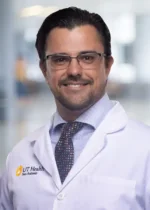 Gustavo Almeida, PhD, an assistant professor in the department of physical therapy, is studying blood flow restriction exercise to see if it will improve outcomes for people awaiting total knee replacements.
Gustavo Almeida, PhD, an assistant professor in the department of physical therapy, is studying blood flow restriction exercise to see if it will improve outcomes for people awaiting total knee replacements.
In his current study, Almeida found that nine of 13 patients doing exercise while their blood flow was restricted gained function before surgery and maintained those gains afterward.
“So that’s really like a wow moment for me,” he said.
Almeida noted that this type of exercise also has potential beyond those getting knee replacements.
Episode 27: Whole blood ambulances
For the last five years, first responders all over the world have been watching San Antonio.
“San Antonio was one of the first and still is the only metropolitan EMS system to carry blood in America,” said C.J. Winckler, MD, associate clinical professor, department of emergency health sciences.
He said eight city EMS vehicles carry whole blood that can be transfused into people who might otherwise bleed to death before they get to the hospital.
“The rest of the country, actually, the rest of the world is looking at us for guidance,” he said.
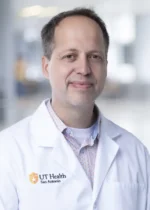 Episode 26: APOBECs and the fight against cancer
Episode 26: APOBECs and the fight against cancer
An enzyme called apolipoprotein B mRNA-editing enzyme, catalytic polypeptide — better known as APOBEC — typically protects against viruses. But in cases with cancer, these enzymes can destroy genomes instead of viruses.
Reuben Harris, PhD, chair, department of biochemistry and structural biology, is dedicated to understanding these enzymes.
Harris and his team propose that after an APOBEC-positive tumor is removed, if these enzymes can be shut off, the risk of cancer returning, spreading or becoming resistant to medication can be reduced.
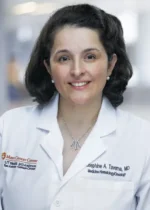 Episode 25: Targeting lung cancer
Episode 25: Targeting lung cancer
Josephine Taverna, MD, oncologist, Mays Cancer Center, home to UT Health San Antonio MD Anderson Cancer Center, envisions a revolution in lung cancer treatment.
Cancer cells can spread by enlisting other types of cells to a tumor using signals from two specific proteins. But Taverna says we can disrupt those signals.
“What we’ve found is that the tumor cell cannot recruit in the supportive host cells in the tumor microenvironment, when you block both signals with drugs,” she said.
Taverna will lead a clinical trial of two drugs later this year that will target the tumor microenvironment and hopes they dramatically improve the prognosis of those with lung cancer.
Episode 24: Fighting Alzheimer’s at the eye doctor
Margaret Flanagan, MD, department of pathology and laboratory medicine, is a neuropathologist — an expert in brain tissue and how it changes in the presence of diseases like Alzheimer’s. Flanagan is working on a test to help detect dementia early at the eye doctor’s office.
Researchers at the University of Minnesota developed a retina scanner they suspected might pick up amyloid beta in the eye that could signal changes in the brain. Flanagan was able to validate the findings.
The end goal is to eventually have a scan like this available to patients getting their eyes checked to let them know if there is something there that may result in dementia. If so, people can begin treatment before irreversible changes start to occur.
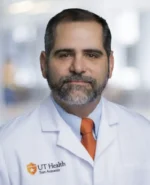 Episode 23: Tooth pain with a purpose
Episode 23: Tooth pain with a purpose
Anibal Diogenes, DDS, PhD, department of endodontics, studies the tooth’s pulp which contains a connective tissue inside of the tooth with “immunological, reparative functions.”
The nerves inside the tooth pulp cause pain with a purpose. They talk with other cells, “like a surveillance system, and they’re trying to tell the tissue to repair itself,” Diogenes said. He is studying this communication in a condition called apical periodontitis to determine how the nerves might send out that repair signal without the pain and says understanding that communication will have implications for whole-body health.
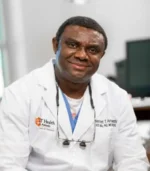 Episode 22: Strengthening your teeth
Episode 22: Strengthening your teeth
Bennett Amaechi, PhD, BDS, professor of cariology, department of comprehensive dentistry, is focused on discovering products that will prevent dental caries — a disease of the teeth that leads to demineralization and eventually cavities. Amaechi is also developing products that will protect the teeth of people who can’t create saliva because of medication that causes dry mouth or disease, like oral cancer.
Episode 21: Taking on America’s number one killer
Allen Anderson, MD, FACC, department of medicine, chief, cardiology division, has a passion for diagnosing and treating people with heart failure. He has cared for patients with advanced heart failure, patients needing transplants and patients needing mechanical pumps. That is why Anderson is excited about all that is being learned about America’s number one killer, cardiovascular disease, at UT Health San Antonio.
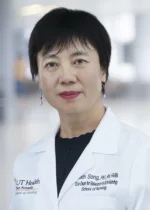 Episode 20: Cancer’s silver tsunami
Episode 20: Cancer’s silver tsunami
With a large patient population needing cancer care and a shortage of people to provide that care, Lee Song, PhD, RN, vice dean for research and scholarship, is studying an eHealth symptom and complication management program for cancer patients that attempts to recreate the clinical process at home to help ease the burden on caregivers.
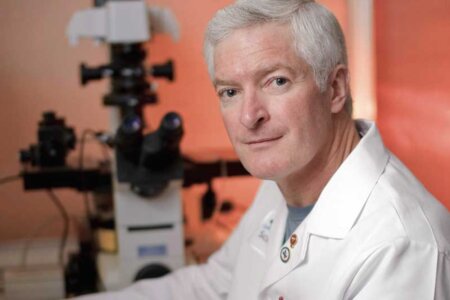
Episode 19: Eat your pain away
Feeling pain? Adjusting your diet might help, said Ken Hargreaves, DDS, PhD, professor in the Department of Endodontics, who has spent nearly 40 years studying pain mechanisms and how to better treat patients.
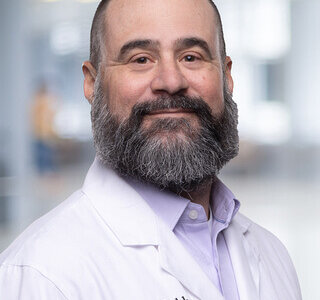 Episode 18: A crisis of loneliness
Episode 18: A crisis of loneliness
Loneliness and social isolation can make you as sick as obesity or 15 cigarettes a day. So Jason Rosenfeld, DrPH, director of global health education at the Cheever Center for Medical Humanities and Ethics, is working a crisis of loneliness in the U.S. by adapting a community health model from Africa.
Healthy teeth and gums are important for overall health, said Peter Loomer, DDS, PhD, dean of the UT Health San Antonio School of Dentistry. His goal is for oral health care to be accessible to everyone, and that is why the school launched the Center for Global and Community Oral Health in November. Its purpose is to offer opportunities to study and develop solutions to pressing dental challenges facing the global population.
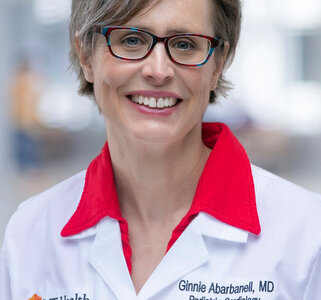 Episode 16: When you clamp the cord matters
Episode 16: When you clamp the cord matters
Ginnie Abarbanell, MD, chief of pediatric cardiology, is involved in a study to determine whether when a newborn’s umbilical cord matters in babies with congenital heart disease. Waiting before clamping the cord may improve both surgical outcomes and neurodevelopment in babies with congenital heart disease.
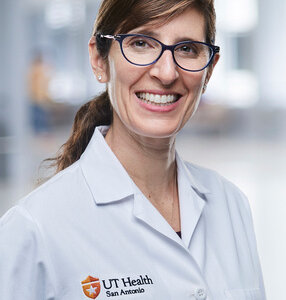 Episode 15: Communicating with aphasia
Episode 15: Communicating with aphasia
Cathy Torrington Eaton, PhD, an assistant professor in the Department of Communication Sciences and Disorders is an expert in aphasia, which can quickly seize a person’s independence and identity. “Aphasia is specific to language. So your ability to express yourself with the words that you want to find, sentences that you need to put together, those types of impairments can also affect your ability to understand language,” she said.
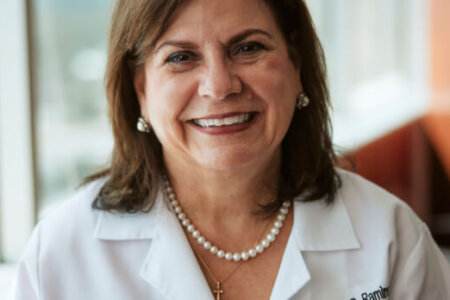 Episode 14: The Avanzando Caminos Hispanic cancer survivor study
Episode 14: The Avanzando Caminos Hispanic cancer survivor study
“No study had been funded to really look at the needs of our Latino cancer survivors. We’re the first study to be doing this,” said Amelie Ramirez, DrPH, MPH, chair of Population Health Sciences at UT Health San Antonio. “And they are so grateful to us because they said, ‘nobody’s bothered to ask me about my cancer journey.’”
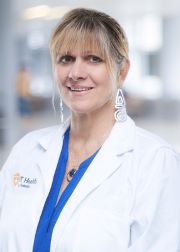
Episode 13: Swallowing ‘workout’ for people with early Parkinson’s
Giselle Carnaby, CCC-SLP, MPH, PhD, a speech pathologist and public health scientist who directs the PhD in Health Sciences program, founded the Swallowing and Upper Aerodigestive Research Laboratory, where she’s working to determine whether an exercise-based program focused on swallowing could help people with early Parkinson’s disease maintain their abilities for longer.
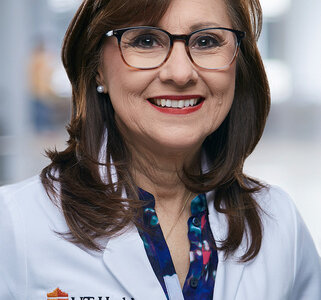 Episode 12: Spinal cord injury and walking again
Episode 12: Spinal cord injury and walking again
Selina Morgan, DPT, PT, assistant professor in the Department of Physical Therapy, believes that there are thousands of people in wheelchairs who don’t have to be.
 Episode 11: Thriving with congenital heart disease
Episode 11: Thriving with congenital heart disease
Ginnie Abarbanell, MD, chief of pediatric cardiology, treats everything from heart murmurs to congenital heart disease in children – which is more common than most may think.
 Episode 10: Early screening to prevent congenital heart disease
Episode 10: Early screening to prevent congenital heart disease
Congenital heart disease can often be detected at the mid-pregnancy ultrasound, which dramatically improves outcomes. But Aaron Abarbanell, MD, MSCR, chief of pediatric cardiac surgery at UT Health San Antonio, said adequate prenatal care is essential.
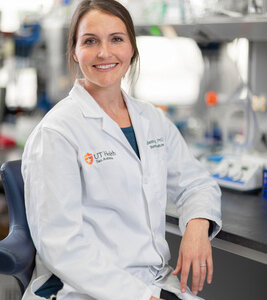
Episode 9: Alzheimer’s and the inflammatory trigger
Bess Frost, PhD, an associate professor in Cell Systems and Anatomy, and her team recently discovered that an inflammatory trigger, like one present during viral infections, is elevated in Alzheimer’s — but this inflammatory trigger isn’t from our time.
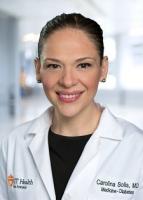
Ozempic isn’t the only exciting diabetes medication out there on the market. Sodium-glucose cotransporter-2 inhibitors have a multitude of potential health benefits, said Carolina Solis-Herrera, associate professor of medicine and chief of the Division of Endocrinology. She also serves as medical director of Diabetes, Obesity and Metabolic Health.

Episode 7: Treating pre-diabetes
One out of three people in the U.S. has pre-diabetes, said Carolina Solis-Herrera, MD, associate professor of medicine and chief of the Division of Endocrinology. She also serves as medical director of Diabetes, Obesity and Metabolic Health.
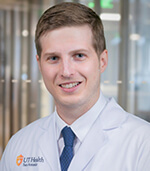
Brain donations provide families with answers and closure while providing key resources for research, said Kevin Bieniek, PhD, director of the Brain Bank at the Glenn Biggs Institute for Alzheimer’s and Neurodegenerative Diseases at UT Health Science Center San Antonio.
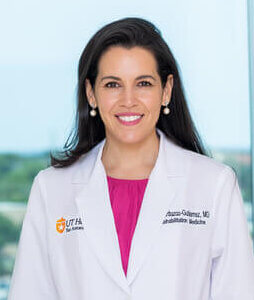 Episode 5: Counter long COVID with pacing
Episode 5: Counter long COVID with pacing
Monica Verduzco-Gutierrez, MD, professor and chair in the Department of Rehabilitation Medicine, teaches techniques to conserve energy to patients experiencing long COVID.
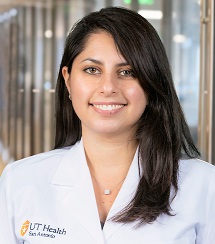
Episode 4: Omega 3 fatty acids to fight Alzheimer’s
People in their 40s and 50s may be able to fight Alzheimer’s disease with Omega 3 fatty acids found in fatty fish and fish oils, according to Claudia Satizabal, Ph.D, assistant professor of population health sciences with the Glenn Biggs Institute for Alzheimer’s and Neurodegenerative Diseases at UT Health San Antonio.
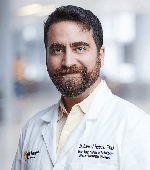 Episode 3: Using AI for brain health diagnoses
Episode 3: Using AI for brain health diagnoses
Artificial intelligence may be somewhat unsettling, but it also has the potential to improve and even save lives, according to Mohamad Habes, PhD, assistant professor of radiology and director of the neuroimaging core at the Glenn Biggs Institute for Alzheimer’s and Neurodegenerative Diseases at UT Health Science Center San Antonio.
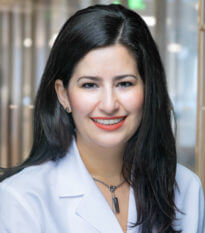
Episode 2: Brain healthy diets
Researchers have suspected that foods that cause inflammation speed up brain aging and cognitive decline, but nutrition scientist and epidemiologist Debora Melo van Lent, PhD, wanted evidence.
 Episode 1: Long COVID and the road to recovery
Episode 1: Long COVID and the road to recovery
Monica Verduzco-Gutierrez, MD, professor and chair in the Department of Rehabilitation Medicine, has been running two long COVID clinics since early in the pandemic. Every case is different, she said.


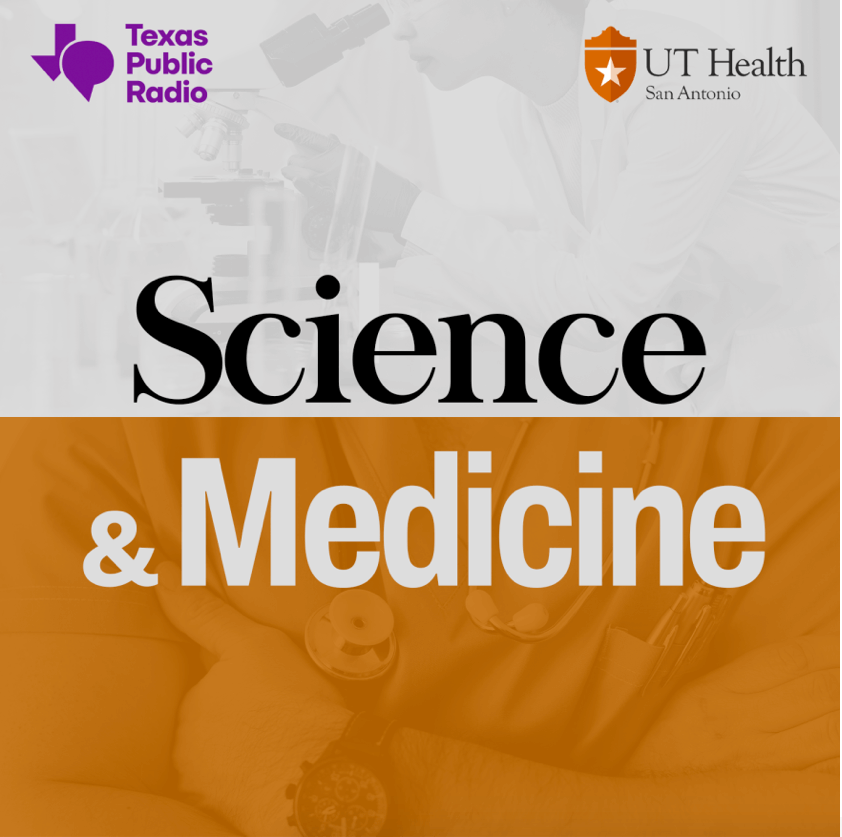
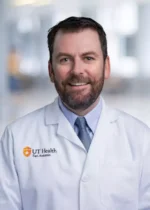
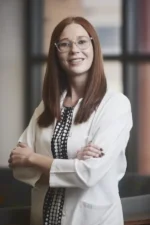
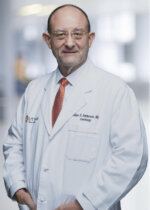
 Episode 17: Go to the dentist
Episode 17: Go to the dentist